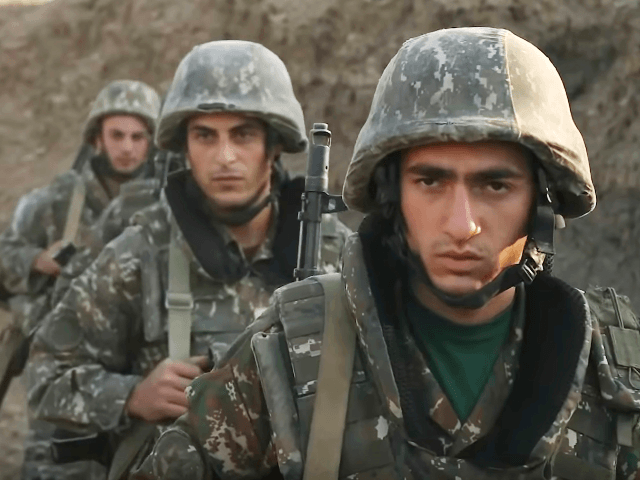Armenian President Armen Sarkissian said on Wednesday that the conflict between Armenia and Azerbaijan in the Nagorno-Karabakh region of the Caucasus mountains could become “another Syria” if the international community does not take action.
“Imagine Caucasus becoming another Syria?” Sarkissian said in a CNBC interview. “The international community has to realize that if you don’t interfere now, then Caucasus will become another huge problem.”
Sarkissian criticized Turkey’s active support for Azerbaijan in the conflict, noting that the Turks “have problems 360 degrees around them” in the Mediterranean, Greece, Libya, and Iraq.
“They are creating problems everywhere,” he said. CNBC reported that many Armenians believe Turkey’s support for Azerbaijan is partly motivated by lingering animosity over the Ottoman Empire’s genocide of the Armenians a century ago – an event the modern Turkish government refuses to acknowledge.
Sarkissian said Turkey’s concerns about potential damage to the vital oil and gas pipeline running through Azerbaijan are “absolute nonsense.” He said that if Armenia was interested in “shooting the pipeline,” it would have done so “20 years ago, but not now.”
Bloomberg News found the oil markets relatively relaxed about the safety of the Azeri pipeline for the moment, possibly because global demand for energy is down due to the coronavirus and alternative sources are plentiful. That calculation could change when the pipeline begins gas deliveries to Italy and Greece next month – and change again if Libyan oil production ramps up enough to make the Azeri pipeline less crucial for all parties except Azerbaijan itself.
“While the proximity of the pipelines to the border puts them at potential risk, Armenia has not attacked the lines during previous escalations in the conflict between the two countries, which has been simmering for almost 30 years,” Bloomberg observed, making essentially the same point as Sarkissian. The pipeline is largely underground and was tough enough to resist a few episodes of mischief during conflicts involving Georgia, Russia, Turkey, and Turkey’s adversaries in the PKK Kurdish separatist group without major disruptions.
Both Azerbaijan and Armenia refused calls for a ceasefire on Thursday, as did Turkey. The latest call for an end to hostilities came in a joint statement from U.S. President Donald Trump, French President Emmanuel Macron, and Russian President Vladimir Putin. Turkish President Recep Tayyip Erdogan responded that a ceasefire will only be possible if Armenian forces withdraw from their “occupation” of Azeri territory.
“Given that the USA, Russia and France have neglected this problem for nearly 30 years, it is unacceptable that they are involved in a search for a ceasefire,” Erdogan said.
President Sarkissian sent a letter to Egyptian President Abdel Fattah el-Sisi on Wednesday asking him to intervene diplomatically in the conflict.
“It is with pain and great discontent that I must inform you that Azerbaijan has launched another offensive against the Republic of Artsakh which is also targeting civilians. As I am writing this letter, dozens of civilians and soldiers of both sides have already been either killed or wounded,” Sarkissian wrote to Sisi, using Armenia’s preferred name for the Nagorno-Karabakh conflict zone.
Nagorno-Karabakh is an area inside Azerbaijan’s borders with a heavily Armenian population. Armenia views the separatists in the province as freedom fighters struggling for three decades to throw off Azeri domination, while Azerbaijan and Turkey view Armenian forces as invaders illegally occupying Azeri soil. In a speech commemorating “Artsakh Independence Day” on September 2, Sarkissian described the contested area as indispensable to fully reassembling the Armenian nation after the Ottoman genocide.

COMMENTS
Please let us know if you're having issues with commenting.